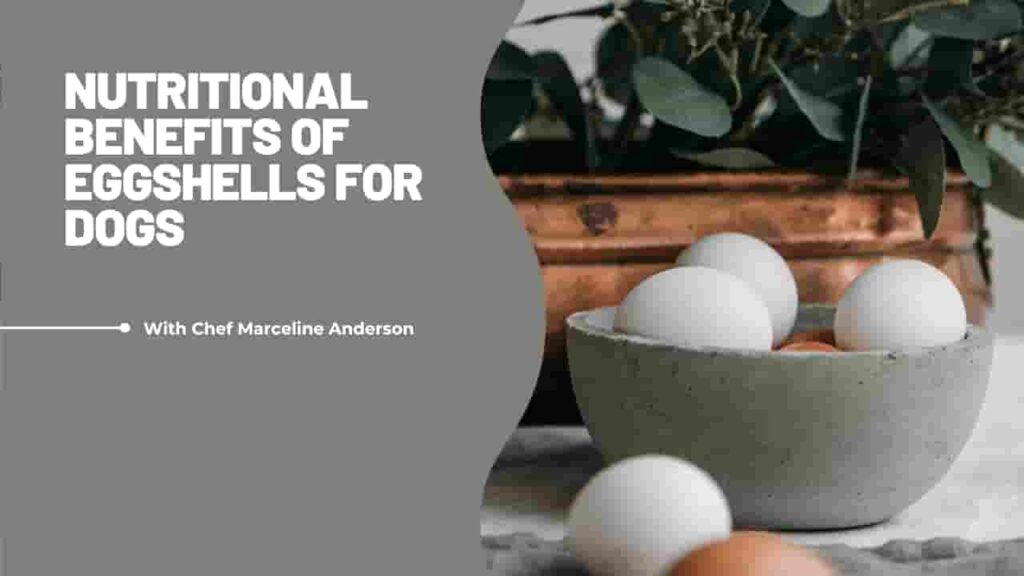Is It Safe for Dogs to Eat Eggshells
Eggshells can be a good source of calcium and other essential nutrients that help maintain strong bones and dental health in dogs but should only be given in small amounts. However, not all dogs should have eggshells in their diet.
Dogs that have high calcium levels or a history of calcium oxalate bladder stones may face health risks from the high calcium content in eggshells.
According to Dr. Michelle Burch, dogs prone to these conditions should not consume eggshells, as it could worsen their health issues.
Always consult your vet before adding eggshells or making any changes to your dog’s diet to ensure it’s safe and beneficial for their specific health needs.
Nutritional Benefits of Eggshells for Dogs
For pet owners who prioritize top-quality nutrition, incorporating eggshells into your dog’s diet can be beneficial.
Eggshells, when finely ground into a powder, are an excellent source of calcium, amino acids, and vitamins. These nutrients are crucial for supporting your dog’s bone health and overall wellness.

Adding ground eggshells to your dog’s meals can significantly enhance the nutritional value of their diet, offering an easy and effective way to supplement essential nutrients.
Considerations Before Feeding Eggshells to Dogs
However, it’s important to consult your veterinarian before introducing eggshells to your dog’s diet. While eggshells provide beneficial calcium, there are other more palatable and potentially safer options for calcium supplementation.
Additionally, if not properly prepared, the sharp edges of eggshells could pose a risk to your dog’s internal health. Always ensure the eggshells are finely ground to avoid any potential hazards.
Eggshell Benefits for Arthritic Dogs
Research from 2016 highlights the potential of eggshell membranes to aid in reducing joint pain and improving mobility for older, arthritic dogs.
If your dog is suffering from arthritis, it’s advisable to consult with your veterinarian about targeted supplements or medications to effectively manage their symptoms.
Nutritional Value of Eggshells for Dogs
Eggshells, when included as part of a boiled egg and finely broken down, can provide a nutritious addition to your dog’s meals, helping to prevent choking hazards.
They are particularly rich in calcium, making them a beneficial supplement for dogs that may find chewing hard bones difficult.
For safety, always cook the eggshells thoroughly to eliminate any risk of salmonella and ensure they are ground finely to avoid any internal harm.
Potential Health Risks of Eggs for Dogs
Before changing your pet’s diet, it’s essential to consult with a veterinarian. Here’s what you need to know about the risks:
- Salmonella Exposure: Feeding your dog raw eggs could increase the risk of salmonella poisoning.
- Biotin Deficiency: Regular consumption of raw eggs might lead to a deficiency in biotin (Vitamin B7), affecting your dog’s health.
- Excessive Calcium from Eggshells: While eggshells are a rich source of calcium, too much can disrupt your pet’s nutritional balance, possibly leading to digestive problems like vomiting and diarrhea, particularly in puppies.
Read more: Potential Health Risks of Eggs for Dogs
Benefits of Eggs and Eggshells for Dogs
Eggs are a nutritious choice for dogs, providing about 75 calories, 6 grams of protein, and 5 grams of fat per cooked egg. They’re highly digestible and packed with essential nutrients.
Eggshells contain calcium and other minerals such as collagen, important for bone health and muscle function, especially in older dogs.
Recent studies, such as one from 2023, indicate that eggshell membranes may reduce joint pain and improve joint function. They also help maintain the health of your dog’s skin and coat. However, it’s crucial to prepare eggshells properly to mitigate any health risks.
How to Safely Prepare Eggs & Eggshells for Your Dog
Always consult your veterinarian before introducing eggs to your dog’s diet to ensure they fit their nutritional needs. Follow these steps:
- Gradual Introduction: Begin by adding eggs to your dog’s meals once or twice a week to prevent gastrointestinal issues.
- Cook Thoroughly: Ensure eggs are cooked to an internal temperature of 160 degrees Fahrenheit without oil, butter, salt, or other additives to avoid salmonella risk.
- Include the Whole Egg: Feed both the yolk and the white to balance the effects of avidin, an enzyme in the white that inhibits biotin absorption.
Preparing Eggshells
- Clean and Sterilize: Wash and boil the eggshells to remove bacteria and salmonella.
- Powder Form: Grind the eggshells into a fine powder using a food processor.
- Gradual Integration: Start with small amounts, gradually increasing to safely boost your dog’s calcium intake without overwhelming their digestive system.
Incorporating Eggshell Powder into Your Dog’s Diet
Eggshell powder can be a beneficial supplement for dogs, especially those on a homemade diet. Here’s how to safely add it to your dog’s meals:
- Prepare in Bulk: Grind the eggshells into a fine powder and store in an airtight container. This preparation allows for convenient use throughout the week.
- Mix Thoroughly: Integrate the powdered eggshells into your dog’s food, either by stirring directly into the meal or sprinkling it on top as a garnish.
Moderation in Supplementation
It’s crucial to manage the quantity of eggshell powder in your dog’s diet to avoid the potential harm of excess calcium:
- Recommended Dosage: The general guideline is to add 1.25 teaspoons of eggshell powder for every 1,000 calories of food your dog consumes.
- Start Gradually: If introducing eggshells for the first time, begin with half a teaspoon to see how your dog reacts, then adjust accordingly.
- Tailor to Your Dog’s Needs: The frequency of eggshell supplementation can vary—ranging from twice a day to twice a week—based on your dog’s age, breed, and specific nutritional needs.

Enhancing Your Dog’s Nutrition
For optimal results, consider combining eggshell supplementation with other health supports:
- Add Probiotics: Including a probiotic like Native Pet’s probiotic powder can aid in supporting your dog’s digestive health. This supplement can be added to meals with or without eggshell powder to promote balanced gut flora and overall health.
How to Safely Feed Eggs to Your Dog
Ensure that eggs are thoroughly cooked before feeding them to your dog to avoid health risks. Boil or scramble the eggs without any oil, butter, salt, or additives to keep them safe and nutritious for your pet.
Scrambled eggs are particularly easy for dogs to digest and are an excellent way to provide the protein needed to maintain lean muscle mass and energy.
Also read: salty-licorice-cats-difference-in-breed-and-sweet
Understanding the Risks and Precautions When Feeding Eggs
- Cook Eggs Thoroughly: Uncooked eggs can contain salmonella and other harmful bacteria.
- Avoid Additives: Cook eggs plainly, without oil, butter, salt, or other seasonings that might be harmful to dogs.
- Control Portion Size: Feed scrambled eggs in moderation due to their calorie and fat content to prevent obesity and related health issues.
- Monitor Your Dog’s Reaction: Keep an eye out for signs of digestive upset or allergies when introducing eggs, and consult your vet if any adverse effects occur.
Nutritional Benefits of Eggs for Dogs
Eggs are packed with valuable nutrients that support various aspects of a dog’s health:
- Protein: Essential for muscle growth and repair.
- Iron: Promotes healthy blood circulation and energy levels.
- Fatty Acids: Enhance the shine and health of a dog’s coat.
- Vitamins such as Riboflavin (B2), Vitamin A, and B12: Support energy production, vision, immune function, and brain health.
- Selenium: Boosts the immune system and provides antioxidant benefits.
Are Eggs Beneficial for Dogs?
Yes, eggs are highly beneficial for dogs and safe when cooked properly. They provide a substantial source of protein and essential nutrients like linoleic acid and vitamins that are crucial for maintaining healthy skin and a glossy coat.
Should Dogs Eat Raw Eggs?
Feeding raw or undercooked eggs to dogs is not recommended due to the risk of salmonella. Always cook eggs completely to eliminate any potential health risks.
Emergency Steps if Your Dog Eats a Raw Egg
If your dog consumes a raw egg, watch for symptoms of salmonellosis and consult your vet immediately for guidance and possibly a health check-up.
Recommended Egg Intake for Dogs
Limit egg consumption to no more than one egg per day for dogs, treating it as a supplement to their regular diet rather than a primary source of protein. This helps maintain a balanced diet alongside their standard dog food.
Determining the Right Amount of Eggs for Your Dog
To find the appropriate serving size of eggs for your dog, it’s essential to consult with your veterinarian. The suitable quantity depends on various factors specific to your pet, such as:
- Age: Younger and older dogs have different nutritional needs.
- Size: Larger dogs may require more protein and nutrients than smaller breeds.
- Breed: Certain breeds might have specific dietary restrictions or needs.
- Activity Level: More active dogs could benefit from higher protein intake.
- Existing Medical Conditions: Dogs with health issues may need a modified diet.
This personalized approach helps ensure that your dog can enjoy the nutritional benefits of eggs without disrupting their overall diet and health.
Also read: dogs-eat-popcorn-surprising-facts-you-need-to-know
Exploring Alternative Calcium Sources for Dogs
While eggshells are an excellent source of dietary calcium for dogs, not all pets may like them. Here are some alternatives:
- Raw Bones: These can be a natural source of calcium, especially from chickens, ducks, turkeys, and other animals.
- Calcium Supplements: These are readily available and can be a convenient addition to your dog’s diet, whether they eat raw or cooked food.
Consulting with Experts
It’s advisable to work with a canine nutritionist to ensure your dog receives the right amount of calcium for optimal bone, joint, and muscle health. Proper calcium intake is crucial for your dog’s overall well-being and happiness.
Is it Safe to Feed Dogs Eggs with the Shell Intact Daily?
Dogs can safely consume eggs with their shells, but it’s important to prepare them properly to prevent health issues like choking or digestive problems. Grinding the shells into a fine powder before feeding is recommended to safely deliver their nutritional benefits.
However, feeding a whole egg with the shell every day might be too much for some dogs, depending on their size and dietary needs. Always check with your veterinarian to get personalized advice.
How to Safely Feed Raw Eggshells to Dogs
To safely incorporate raw eggshells into your dog’s diet, make sure to:
- Clean Thoroughly: Wash the eggshells to eliminate any contaminants.
- Crush Properly: Grind the eggshells into a fine powder to avoid choking hazards and improve digestion.
This preparation method ensures that your dog can safely absorb the calcium and other essential minerals from the eggshells, enhancing their diet.
FAQ’s:
Can Dogs Eat Scrambled Eggs?
Yes, scrambled eggs are a healthy dietary option for dogs and are recommended by many veterinarians. They provide a simple way to add nutritious eggs to your dog’s diet.
Can Dogs Eat Eggs Every Day?
It’s best to moderate egg intake for dogs due to their high-fat content. Always follow your veterinarian’s portion recommendations to maintain a balanced diet.
Can Dogs Eat Eggs and Rice?
Yes, eggs and rice are safe for dogs to eat together. Rice provides essential carbohydrates and fiber, which are gentle on a dog’s digestive system.
How Much Egg Can I Give to My Dog?
Limit your dog’s egg consumption to no more than one egg per day and consult your vet before introducing new foods into their diet.
Can Dogs Eat Boiled Eggs?
Yes, boiled eggs are safe for dogs. They are a high-quality protein source that supports muscle development and are easy to digest.
How Many Eggs Can a Dog Eat in a Week?
Generally, one egg per day is safe for most dogs, but it’s better to limit this to a few eggs per week for a balanced diet. Consult your veterinarian for the best advice tailored to your dog.
Can Dogs Eat Eggshells Every Day?
It’s not recommended for dogs to eat eggshells daily. Occasionally, finely ground eggshells can be added to their food as a calcium supplement. Always consult your vet to determine the appropriate frequency and quantity.
At What Age Can Puppies Eat Eggs?
Puppies can start eating eggs at about 12 weeks old, as they transition to solid food. Introduce eggs gradually, ensuring they are fully cooked and in small portions suitable for their digestive systems.
Can Dogs Eat Raw Egg Yolk?
Feeding raw egg yolk to dogs is not recommended due to the risk of salmonella and potential interference with biotin absorption caused by avidin in raw egg whites. It is safer to serve cooked eggs to ensure they are free from harmful bacteria.
Conclusion
Dogs can safely consume eggshells if they are correctly prepared. The most effective method is to grind the eggshells into a fine powder.
This preparation not only makes the eggshells easy to digest but also prevents risks such as choking.
Additionally, finely ground eggshells enhance the availability of calcium and other essential minerals, which are crucial for supporting your dog’s bone health and meeting their overall nutritional requirements.
